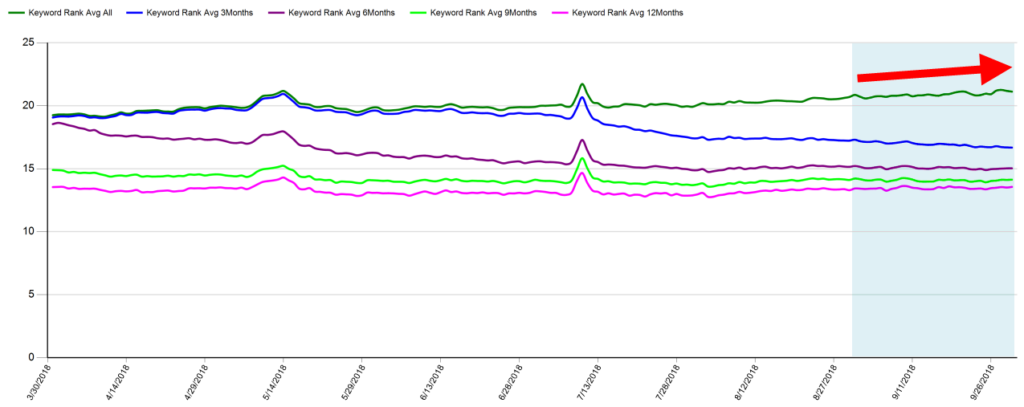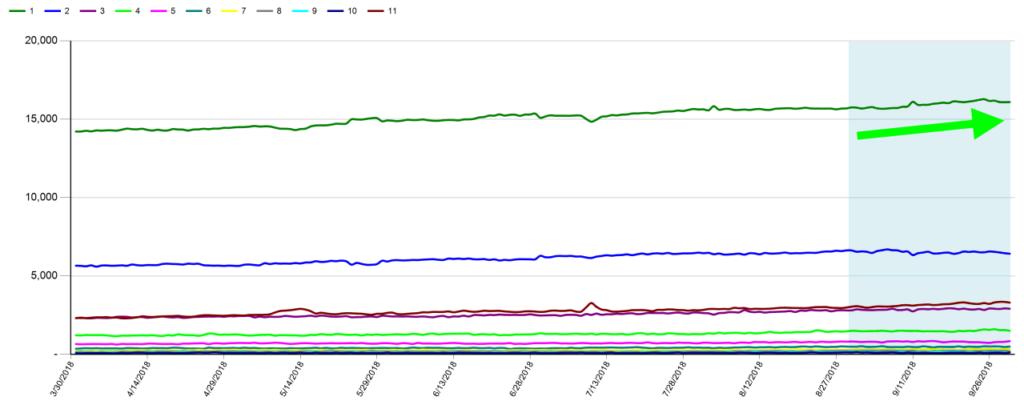Rankings had a crazy month during September with a lot of changes happening. Some changes were not anticipated, but others we’ve seen slowly roll out over the past few months as we’ll discuss in this SEO update.
Here’s the SEO update for the month:
To start, we did see a slight decline in overall performance, with keywords older than 12 months losing the most ground.

But we continue to see more page one rankings, most likely due to newer keywords. The Medic Update rollout most likely caused many of these rank changes, as I discussed in last month’s blog. Below I will get into what we learned from reviewing keywords that saw a dramatic change in rankings in both positive and negative directions.

Medic Update Observations
We reviewed hundreds of keywords by hand that appeared to be impacted by the recent core algorithm change on Google. It’s speculated that the Medic Update had its base around content. Specifically targeting the more nuanced aspects of content with factors like usability, expertise, and topical expertise. While this speculation proved to be mostly true, it seems there was a bit more to the algorithm update with overall ranking changes seen.
Our initial observations revealed an interesting trend that seemed to be common amongst those that had impacted keywords. The charts below show the trend as a total count of unique keywords that a website ranked for during the past year.



The trends overall show a large uptick of rankings a few months before seeing a drop in ranked keywords. To take this a bit further we reviewed keywords that had ranked higher versus what is currently ranking.
We found an apparent issue where websites were ranking for national, unrelated, or ambiguous keywords.
Examples from an insurance client in the Chicago area:
- liquor limo
- taxi cab service chicago
- expanding your home
- st louis limo companies
- mo taxi
- driving test illinois 2014
- 1959 limo
- metropolitan savings and investment plan
- phone stand kickstarter
- driver license illinois hours
- georgia insurance binder
- standard auto care
- illinois charter bus companies
- how much is hurricane insurance in florida
- standard il
- metropolitan life contact
- taxi mo
- metro bus 258
- the rate at which something happens
- metropolitan inc
- what is the need of insurance
- metropolitan agencies sri lanka
- metro chicago address
- taxi in illinois
Keep in mind this is just an example from one website with literally hundreds of irrelevant keywords that at one point ranked for it. The overall guess around why this happened most likely coincides with the broad core algorithm updates from earlier this year and most likely means some larger-scale testing occurred around content and how to interpret “quality content”.
What does this mean?
What this means now is that the “drops” we continue to see, especially with historical keywords, could be pull-back from over-ranking. In other words, while overall rankings have been lost they may not have been great keywords in the first place providing any sort of conversion. It’s important to keep this in mind, especially as we see rank shifts. Google said it best when it comes to understanding the most recent algorithm changes:

“As with any update, some sites may note drops or gains. There’s nothing wrong with pages that may now perform less well. Instead, it’s that changes to our systems are benefiting pages that were previously under-rewarded….”
When we viewed those websites that are now winning in terms of ranking, there are a few notable traits that seem to be working for these sites.
- Topical Authority – The largest trait these sites have in common is a large amount of content related to their main topic/service. Take, for example, dentists with the keywords ‘teeth whitening in Houston’. For those now ranking, they cover the topic ‘teeth whitening’ and go in detail about the procedure, cost, alternatives, reviews from past clients, and so much more.
- Consistent Blogging – The newly ranking sites also have blogs and seem to be continuously producing content related to them and their industry. This is not a new concept, but the consistency and expertise gained here could be key to helping them rank.
- Locally Present – High performing small to medium-sized businesses ranking high also had the constant of a robust local presence via Google My Business. This means they have fully optimized profiles, great reviews, and are actually located in the area being searched in the keyword.
What does this mean?
It is quickly becoming apparent that just having a keyword on a generic page will not be enough to rank well, especially for competitive terms. This does not mean abandoning your website. Instead it means working harder to become the expert for your field through blogs and better service pages. If you need an idea of where to start, look at those with high rankings and see what they are doing.
Key Articles
- Use Alt Text to Rank Images – Google’s John Mueller pointed out that alt text is helpful to Google when ranking images in Google Images. (Source)
- Search Console No Longer in Beta – Google announced that its newest version of Google Search Console (formerly Webmaster Tools) is no longer in Beta. (Source)
- September Algorithm Updates – There were a few speculated algorithm updates in September, which John Mueller acknowledged but added these are nothing “huge” and are just regular updates. (Source)
- GMB Review Editing – It was noted and documented that you can edit review responses within the local panel versus needing to log in to the GMB dashboard. (Source)
- Google Turns 20ish – Google celebrates 20 years of providing search for the world wide web. I am sure you all saw the doodle already. (Source)
- Expanded Characters for Title Snippets – It has been recorded by RankRanger that the average snippet length for Titles has increased. (Source)
- Mobile First Indexing Rollout – This is not necessarily new but is a good reminder the mobile first index is actively rolling out with more and more site added daily. The newer bit is a clarification that this will take years to completely roll out. (Source)

